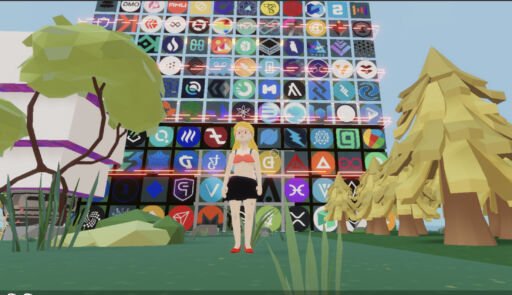“The latest hot real-estate market isn’t on the scenic coasts or in balmy Sunbelt cities. It’s in the metaverse, where gamers are flocking and digital property sales are setting new records.” writes Wall Street Journal. Acquiring digital land in virtual worlds such as the Sandbox and Decentraland is a growing trend amongst investment firms, especially those aligned with blockchain, gaming and luxury pursuits. “Players and avatars in these spaces simulate real-life activities, from shopping to attending a concert” and investors predict that they will spend money in virtual homes and retail spaces. The emerging virtual market which could, depending on whom you ask, ultimately generate revenues of between $1 trillion and $30 trillion, according to The Economist.
That interest reached a new peak this fall when Republic Realm, a firm that develops real estate in the metaverse, paid $4.3 million for land in the world Sandbox. This is the biggest virtual real-estate sale publicized to date, according to the data from the website NonFungible.com, which tracks digital land sales. The digital land was bought from the legendary videogame company Atari and the two firms plan to partner on the development of some of the properties. In another recent transaction $2.5 million was paid for land in the world Decentraland’s Fashion District. The buyer of the site, Andrew Kiguel, chief executive of Tokens.com thinks that “this is like buying land in Manhattan 250 years ago as the city is being built.
While it may seem futuristic, mainstream adoption is around the corner with Facebook renaming itself Meta Platforms Inc. and focusing on online worlds. As with physical spaces, the value of properties will increase as more people join the worlds and spend time in the metaverse.
These digital worlds feature private and public spaces where users can hang out with avatars of their real-life friends. Participants pay in cryptocurrencies to shop, gamble or indulge in more extravagant pursuits. There is risk in the investment since unlike actual real estate, which tends to retain some value even during a market downturn, the value of virtual properties could fall to zero if the technology or platform becomes irrelevant. The volatility of cryptocurrencies strongly impact prices. However, firms like Republic Realm are trying to diversify the portfolio and reduce the risk by buying land in a number of different virtual worlds.
Will the digital-property boom last? The Economist notes that “As in the physical world, profits depend on footfall and people’s willingness to spend real money. For that to happen at scale the user experience must improve. Popular metaverse platforms such as Decentraland and the Sandbox are clunky. The average user may not want to shell out on the graphics cards, virtual-reality headsets and superfast broadband that gamers use to make cyberspace feel more real.”
Alike to the physical counterparts, in some cases the land sits vacant and appreciates while with others, it pays an architect to design virtual homes or malls and a game developer to build them although there are zoning rules in the metaverse as well. But unlike in the real world, metaverse buildings can defy the laws of physics by appearing to hover above the ground. At the end, the company can charge rent, just like a regular landlord and employs an asset manager to deal with tenants’ complaints and change requests. The Rodeo Drive or Fifth Avenue of the digital era is being built today.



